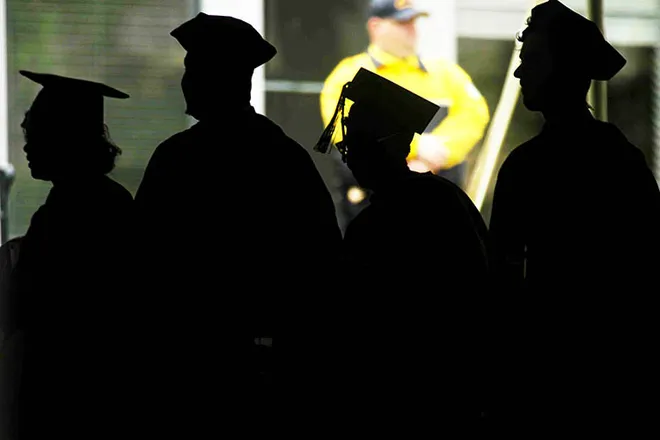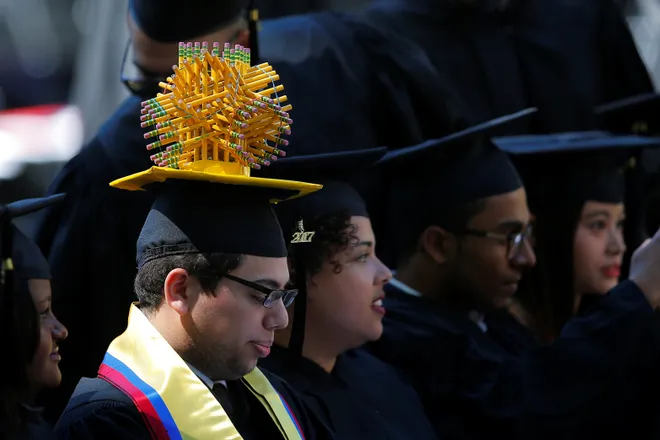Oh, the humanities: Can you guess the most-regretted college majors?
If you studied humanities, life sciences or law in college, there’s a better-than-40% chance you regret the choice now.
That’s the takeaway from a report by the Federal Reserve, whose researchers perennially ask college graduates whether they would choose a different field of study if they were granted a do-over.
The Fed reports levels of college satisfaction across broad academic categories in a report titled Economic Well-Being of U.S. Households in 2023, published earlier this year.
Researchers asked college completers if they would choose a different field now.
The most-lamented majors: social and behavioral sciences, regretted by 44% of grads, followed by humanities and arts (43%), life sciences (also 43%), law (41%) and education (38%).
The least-regretted fields? Engineering, a choice regretted by only 27% of graduates, followed by computer and information sciences (31%) and health (32%).
Across all fields of study, 35% of college graduates said they would pick a different major, given a second chance.
Of course, regretting your major is not the same as regretting college. The vast majority of college graduates with bachelor's degrees -- more than 80% -- say their education helped prepare them for a well-paying job, according to a May report from Pew Research.
"There are a lot of different ways that people will get something out of their college education," said Hironao Okahana, assistant vice president and executive director of the Education Futures Lab at the American Council on Education, an umbrella group for academia. "We are preparing people who can be flexible and agile in a changing workforce and changing economy."
The Federal Reserve report draws from the 2023 Survey of Household Economics and Decisionmaking, which reached more than 11,000 adults. It provides a snapshot of America’s investment in higher education, and the perceived return on that investment.
Seventy percent of Americans enroll in education beyond high school, the report says, citing federal data. But only 37% attain a bachelor’s degree or more.

More than half of college attenders say it was worth the cost
More than half of adults who attend college feel the financial benefits exceed the costs, the Fed reports. The level of satisfaction generally rises with degree level, and with age.
Among adults ages 30-44 – millennials, essentially – who completed “some college” or a technical degree, only 20% feel the benefits outweigh the costs. The satisfaction quotient rises to 55% for millennials with bachelor’s degrees, and to 66% for those with graduate or professional degrees.
By contrast, a healthy majority of Americans ages 60 and over feel their college education was worth the investment: 75% of bachelor’s recipients, and 86% of those with advanced degrees.
A year of college in the U.S. costs $38,270 a year, on average, according to the Education Data Initiative, a research nonprofit that collects education statistics. College costs have doubled since 2000.
"These folks are looking back on their majors and making a kind of financial calculus, and asking themselves, 'Is this worth what I spent on it?' And for a lot of them, the answer is no," said Bradley Jackson, vice president of policy at the American Council of Trustees and Alumni, a right-leaning nonprofit.
Americans owe nearly $1.8 trillion in student loan debt, more than $40,000 per borrower, according to estimates from the education data nonprofit.

Many least-regretted majors offer good pay
Not surprisingly, many of the least-regretted college majors fall in fields that offer strong salaries.
Electrical engineers earn an average annual wage of $117,680, according to federal data. Software developers pull down $138,110 a year. Nurse practitioners earn $128,490.
Money is great, but popular majors can also segue into fulfilling careers, academic leaders say.
"Health is everything," said Dr. Michelle Lampl, director of the Center for the Study of Human Health at Emory University, reflecting on the large share of satisfied customers in that field.
"Everyone's life touches on and embodies health," Lampl said. "It is personal, social and global."
Internal surveys at the Atlanta university show 93% of recent graduates are satisfied with their bachelor's degrees in human health.
Salaries can be harder to track at the other end of the regretted-majors spectrum, because degrees in the liberal arts don’t necessarily correlate to specific jobs. Art and design workers earn $65,190, on average. Kindergarten teachers collect $67,790.
Humanities degrees are in sharp decline. The annual tally of bachelor’s degrees in humanities dropped from a peak of 236,826 in 2012 to 179,272 in 2022, according to the American Academy of Arts & Sciences.
Education degrees have been dwindling for decades, according to a 2022 Pew Research report.
“I would give anything to go tell my college self, DO NOT get a master’s degree in teaching,” one Reddit user commented in a 2022 thread about most- and least-regretted degrees. “You’ll be miserable, abused, in debt & in poverty.”

Degrees in STEM fields have been rising steadily
Meanwhile, the number of degrees granted in science, technology, engineering and math has been rising steadily, federal data show.
Former President Barack Obama launched a national campaign in 2009 to boost science and math study during his administration, declaring STEM a national priority.
“We’re seeing a very enthusiastic group of young students coming into our engineering programs across the country,” said Jerome Lynch, dean of the Pratt School of Engineering at Duke University. “There’s a lot of business for our graduates. There’s a lot of opportunity out there.”
Federal survey offers snapshots in time
The Federal Reserve survey began in 2013. A glimpse at past surveys suggests that some fields have risen and fallen in perceived return on investment.
In the 2013 survey, more than half of graduates in engineering, health and life sciences said the benefits of the degree outweighed the costs. The least popular majors, in terms of cost-benefit analysis, were social and behavioral sciences, humanities – and computer science.
(The survey questions were worded differently then, so a direct comparison to 2023 data isn’t possible.)
The federal report focuses on broad divisions of academia. Other reports have drilled down on the popularity of more specific fields of study.

Most regretted major: Journalism
The most popular college major in America is business, according to federal data, with about 375,000 bachelor's degrees conferred in 2022, the most recent year available. Health professions rank second, with 264,000 degrees. Rounding out the top five: Social sciences and history, biological and biomedical sciences, and psychology. (Engineering and computer science rank sixth and seventh.)
There have also been occasional polls of most- and least-loved majors. In one 2022 survey of 1,500 job candidates, the employment site ZipRecruiter enumerated the most-regretted majors:
- Journalism, regretted by 87% of grads
- Sociology, 72%
- Liberal arts and general studies, 72%
- Communications, 64%
- Education, 61%
Hotel suite or dorm room?Unpacking the college campus housing crunch
And here are the least-regretted majors:
- Computer and information sciences: 72% of grads would choose it again
- Criminology: 72%
- Engineering: 71%
- Nursing: 69%
- Health: 67%
Disclaimer: The copyright of this article belongs to the original author. Reposting this article is solely for the purpose of information dissemination and does not constitute any investment advice. If there is any infringement, please contact us immediately. We will make corrections or deletions as necessary. Thank you.







